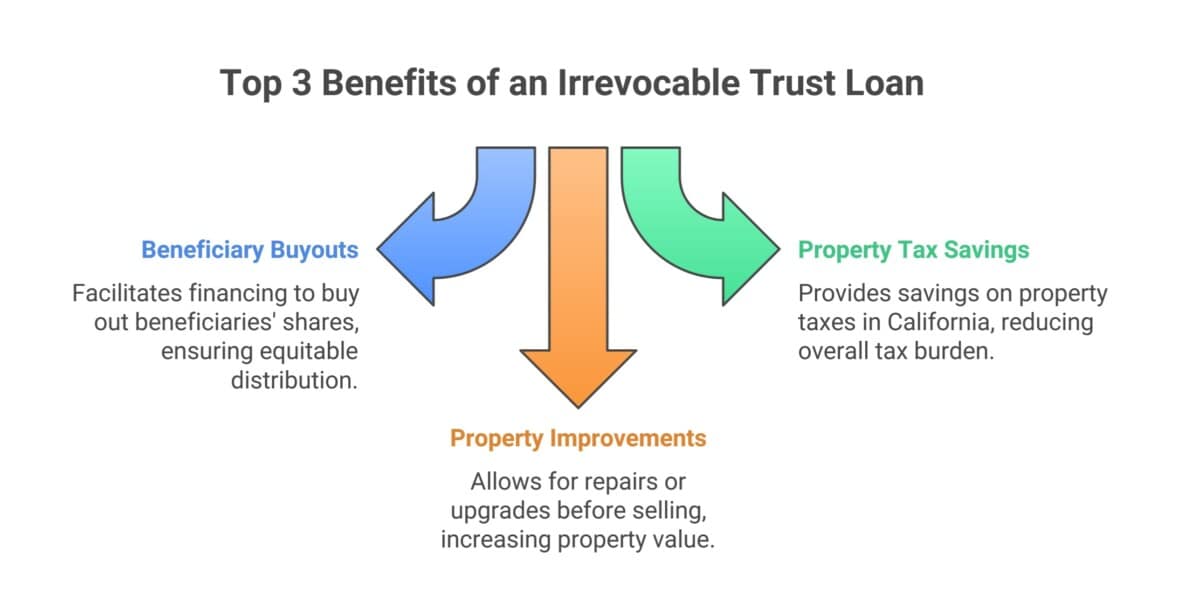
Can an Irrevocable Trust Get a Mortgage or Loan?
Can an Irrevocable Trust Get a Mortgage?
Yes, an irrevocable trust can get a mortgage using California real estate as collateral for the loan. The loan needs to be for the benefit of the trust, trustees or beneficiaries. The most common uses of an irrevocable trust loan are to fund a beneficiary buyout, make repairs to the property or save on California property taxes with Prop 19.
The trust loan will be recorded against the house in the irrevocable trust just like a normal mortgage. The successor trustee of the irrevocable trust will need to work with a specialized irrevocable trust loan lender in California such as North Coast Financial. Traditional lenders are typically not able to make loans against real estate owned by an irrevocable trust.

What are the Benefits of an Irrevocable Trust Loan?
1. Financing Beneficiary Buyouts
When one beneficiary wants to keep a property and other beneficiaries just want cash, an trust loan can provide the trust with the needed liquidity to fund a beneficiary buyout. The trust loan proceeds go directly to the trust’s bank account and can then be distributed to the beneficiaries who wanted the cash. The real estate can then be transferred directly from the trust to the beneficiary who is keeping the property. Once the property is in the name of the individual they can begin the refinance process with a traditional lender.
2. Savings on California Property Tax
Irrevocable trust loans can allow a beneficiary to do a beneficiary buyout of their siblings and then apply for Proposition 19 in California. Prop 19 can help prevent a property tax reassessment for transfers of a primary residence from a parent to a child (from trust to beneficiary). California real estate that has been owned by a family for many years will typically have a very low property tax basis relative to the current market value of the property due to Prop 13. Prop 19 can help maintain the existing property tax basis for the inheriting child.
3. Repairing/Upgrading a Property Prior to Sale
Beneficiaries who wish to sell a trust-owned property may need funds to get the property ready to sell. If the trust doesn’t currently have cash, an irrevocable trust loan can provide the trust with the needed funds to make any repairs or upgrades in order to get top-dollar on the market.
How do Irrevocable Trust Loans work?
An irrevocable trust loan is a specialized financing option where an irrevocable trust borrows money against trust real estate that is used as collateral. While traditional lenders typically don’t offer these loans, private lenders such as North Coast Financial specialize in irrevocable trust financing to help beneficiaries access liquidity without taking real estate assets out of the trust.
Using real estate in the irrevocable trust as collateral for the loan is typically the most cost-effective way to borrow against assets of an irrevocable trust. The irrevocable trust loan lender using real estate as collateral will charge an interest rate as well as loan origination fees. There are inheritance advance lenders that will lend against non-real estate assets within an irrevocable trust but this type of advance is often extremely expensive.
The trust documents must allow (or not specifically prohibit) for borrowing against the assets of the trust. The real estate owned by the irrevocable trust must have sufficient equity relative to the amount of funds the irrevocable trust needs to borrow. Loan amounts up to 65-70% of the current value of the property are typically available.
California irrevocable trust loan lenders usually only provide short-terms of around 12 months. This time-frame is typically plenty of time to transfer the property out of the trust and into an individual’s name and then refinance into a long-term traditional loan. Alternatively, if the irrevocable trust intends to sell the real estate 12 months should be sufficient time.
Can you Take Money Out of an Irrevocable Trust?
A successor trustee is able to take money out of an irrevocable trust if allowed by the trust documents. If the irrevocable trust doesn’t have cash assets available, the trustee may consider a short-term loan secured against real estate owned by the irrevocable trust.
Money taken out of the irrevocable trust typically needs to be used for the benefit of the trust or the beneficiaries of the trust. Common reasons for taking money of the irrevocable trust include paying debts of the trust, equalizing the distribution of trust assets to beneficiaries or fixing up a home owned by the irrevocable trust prior to selling it.
The short-term irrevocable trust loan would be paid off once the property is sold or the property was refinanced once distributed to one or more of the beneficiaries as individuals.
The information provided herein is for educational purposes only. North Coast Financial is not providing any legal, tax or financial advice.
Recent Estate, Probate and Trust Loans Funded by North Coast Financial
Probate & Trust Loans Resource Guide
California Probate, Estate & Trust Loan Request
We will contact you to review the loan scenario and provide a quote.




